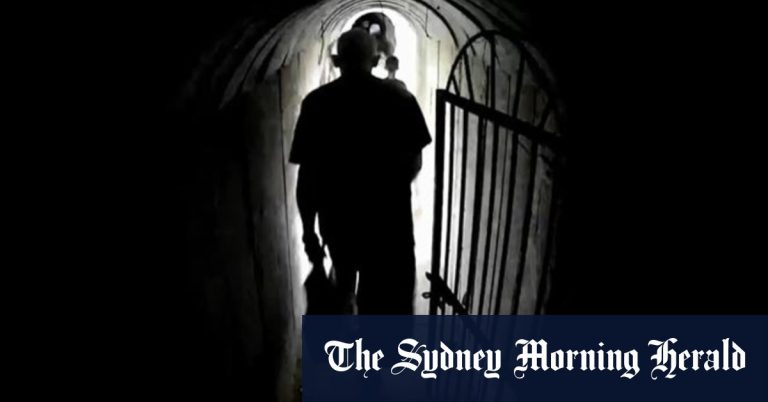Israeli army spokesman Admiral Daniel Hajari said that the army was combing through intelligence files seized during operations in the tunnels. He said the army had several videos of Sinwar.
“While the people of Gaza suffer above ground, Sinwar hides in the tunnels and the ground beneath them, running like a coward,” Hajari said.

Yahya Sinwar, leader of Hamas in the Gaza Strip, in 2018.credit: AP
“So he escaped with his family from an underground tunnel to a safe compound he had previously built. This video of Sinwar is the result of our hunt. This hunt will not stop until we catch him dead or alive.
The video was published at a time when talks that included the United States, Egypt, Israel and Qatar regarding a truce in Gaza ended without achieving any progress. Calls have increased for Israel to stop a planned attack on the southern end of the Strip, which is crowded with more than a million displaced people.
The city of Rafah, whose population before the war was about 300,000 people, is full of displaced people living in camps and temporary shelters who fled there from Israeli bombing in the far northern areas of Gaza during more than four months of war.
Israel says it wants to expel Hamas activists from their hideouts in Rafah and release the Israeli hostages held there. Its army is developing plans to evacuate Palestinian civilians. But no plan has been put in place, and aid agencies say the displaced have nowhere else to go in the torn area.
Although the Palestinians in Rafah are “looking death in the face,” UN Humanitarian Coordinator Martin Griffiths said that the Israeli ground invasion there would make humanitarian relief almost impossible.
“Military operations in Rafah could lead to a massacre in Gaza. They could also leave an already fragile humanitarian operation on the cusp of death,” Griffiths said in a statement.
Residents said that Israeli tanks bombed the eastern sector of Rafah during the night, causing waves of panic.
They said the displaced – dozens so far – began leaving Rafah after Israeli bombing and air strikes in recent days.

Israeli soldiers drive a tank into the Gaza Strip, as seen from southern Israel.credit: AP
Rafah is adjacent to Egypt, but Cairo has made clear that it will not allow a mass exodus of refugees across the border.
Gaza health officials announced 133 new Palestinian deaths in the past 24 hours, bringing the total to 28,473 dead and 68,146 wounded since October 7, when 1,200 people were killed in a Hamas attack across the border into Israel, sparking the war.
Many other people are believed to be buried under the rubble of destroyed buildings across the densely populated Gaza Strip, much of which is in ruins. Supplies of food, water and other necessities are running out, and diseases are spreading.
About half of Gaza's 2.3 million people now live at the Rafah crossing.
“Since Israel said it will invade Rafah soon… we recite our last prayers every night,” he said. “Every night we say goodbye to each other and to our relatives outside Rafah,” said Aya, 30, who lives in a tent with her mother, grandmother and five brothers.
Egyptian President Abdel Fattah al-Sisi held talks in Cairo with CIA Director William Burns and Qatari Prime Minister Sheikh Mohammed bin Abdul Rahman bin Jassim Al Thani with the aim of agreeing on a truce in Gaza, protecting civilians, and delivering more aid to the Strip. The information service said.
In a statement on its website, it indicated “an eagerness to continue consultation and coordination” on key issues, indicating that no progress has been achieved.
The Egyptian statement did not refer to Israel. A Reuters correspondent said that the Israeli delegation left Cairo to return to its country. The Israeli Prime Minister's Office did not immediately respond to a request for comment.
Israel has pledged to continue fighting, for several months if necessary, until it eliminates Hamas.
A Palestinian official said earlier that the two sides are searching for a formula acceptable to Hamas, which insists on Israel's commitment to ending its war and withdrawing its forces from Gaza.
A Hamas official said that Hamas told participants that it does not trust that Israel will not renew the war if Israeli hostages held by Palestinian militants are released.
The hostages were taken in a Hamas raid on southern Israel on October 7. Securing their return is a priority for Prime Minister Benjamin Netanyahu's government, as well as eliminating Hamas, which rules the small coastal region.
South Africa has asked the international court to consider whether Israel's plan to expand its attack on Rafah requires additional emergency measures to protect Palestinian rights.
In a case brought by South Africa, the International Court of Justice last month ordered Israel to take all measures within its power to prevent its forces from committing genocide against Palestinians in Gaza. Israel denies committing genocide and has asked the court to dismiss the case outright.
US President Joe Biden said on Monday that Washington is working on a hostage deal to achieve “immediate and sustainable” calm in Gaza for at least six weeks.

